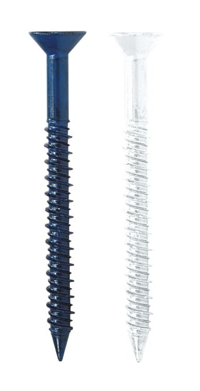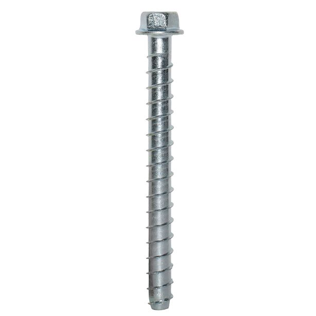By Marcus Kirkwood
Is there such a thing as a screw that goes into concrete? It’s 2019. Of course there is. You may just be calling it a different name. Often referred to as a Tapcon, concrete screws can be found anywhere and everywhere. The most common manufacturers you’ll find in a supply house are Simpson Strong-Tie, Powers Fasteners (now part of DeWalt’s fasteners division), Tapcon and Red Head. Apart from a few generally unnoticeable differences, it’s fair to say that they’re mostly the same and equally effective. Your biggest differentiator will most certainly be price.
Simpson refers to their entire line as Titen screws. They have their regular version for attaching all types of components to concrete and masonry. These fasteners are commonly used in applications such as attaching electrical boxes, light fixtures or window frames into concrete or masonry base materials. These screws come in a hex drive and Phillips flat head option and are also available in white and blue colors.

They also have a Titen HD version, which is essentially a larger version of a Titen, with larger threads and a hex drive head. These are available in a zinc option or stainless steel for highly corrosive applications. These are often called the original screw anchor for cracked and uncracked concrete.

Powers calls their large screw a Wedge Bolt+ and their smaller version the Tapper+. It performs the same task as a Simpson screw.
The major factors separating these newer concrete screw options from a more common wedge anchor are price and ease of use. These newer anchors are a bit more expensive, but require significantly less labor and are much safer, at least on the back end. Both options require the user to pre-drill a hole in the concrete before fastening down their bolt/screw. (In many cases, the proper size drill bit will come with the newer concrete screws.) After the proper size hole is drilled, the screw follows and whatever needs to be anchored down, mechanical box, steel bollard, warehouse shelving, etc is stuck.
In fact, with all styles of anchors, it is more likely that the item being held in place or the concrete itself will budge before any damage is done to the anchor itself. The BIG upside to the newer screws as opposed to wedge anchors, is these screws are removable. Using the same drill used for installation, running them out is just as simple. For wedge bolts, you’ll need to find a grinder and cut the top off for removal. Both dangerous and aesthetically unappealing as the base of that anchor will permanently reside in the concrete.
Ranging in size from 3/16” diameter to ¾” and 1” to 10” lengths, these new pieces of hardware should be a staple in any contractor’s inventory. You’ll save yourself a ton of headaches and give yourself peace of mind. Your fixture isn’t going anywhere unless you want it to.
Use code Concrete Screws for 10% off your first order at www.outpostcs.com.
.png&width=880&height=0)